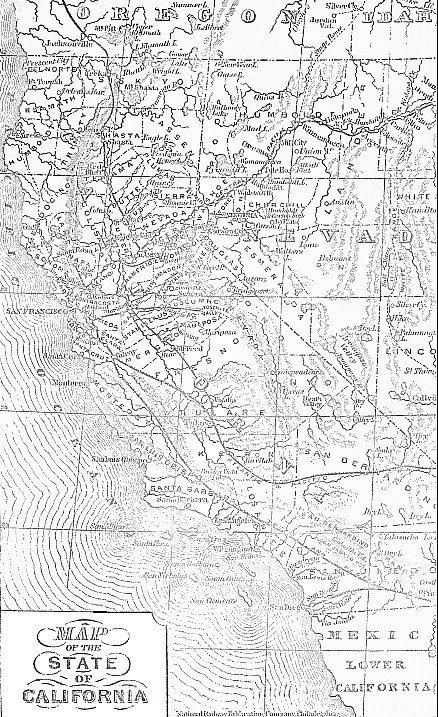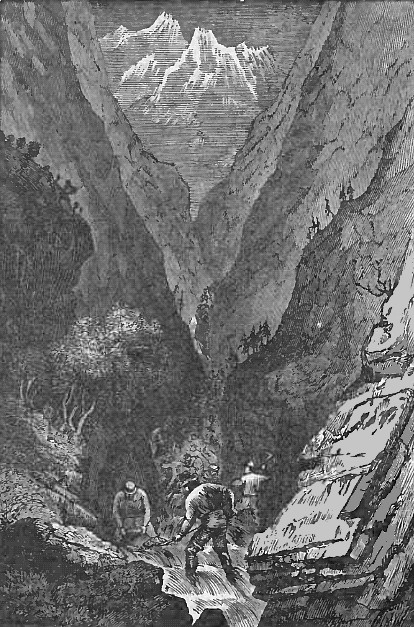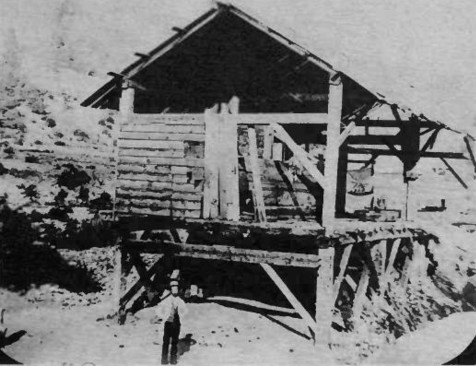Colonel R. B. Mason had succeeded Colonel Fremont in the post of governor of California and military commandant before California became a state. A regiment of New York troops, under the command of Colonel Stevenson, had been ordered to California before the conclusion of the treaty of peace, and formed the principal part of the military force in the territory. When Gold was discovered in 1848, Colonel Mason was asked to look into the matter by the president, and he traveled to the gold country in the spring, a few months after the discovery. He expressed the opinion, in his official dispatch, that "there is more gold in the country drained by the Sacramento and San Joaquin rivers, than will pay the cost of the [late] war with Mexico a hundred times over." History has shown that his estimate was no exaggeration. In fact there can be little reason to doubt, when we take into consideration all the mineral resources of the US, that the territory of California was, at that time, by far the richest acquisition made by this government since its organization.
The following is the appearance of the mines, at the period of Governor Mason's visit, which was three months after the original discovery, he thus graphically describes : "At the urgent solicitation of many gentlemen, I delayed there [at Sutter's Fort] to participate in the first public celebration of our national anniversary at that fort, but on the 5th resumed the journey, and proceeded twenty-five miles up the American Fork to a point on it now known as the Lower Mines, or Mormon Diggins. The hill-sides were thickly strewn with canvas tents and bush arbors ; a store was erected, and several boarding shanties in operation. The day was intensely hot, yet about two hundred men were at work in the full glare of the sun washing for gold, some with tin pans, some with close woven Indian baskets, but the greater part had a rude machine, known as the cradle. This is on rockers, six or eight feet long, open at the foot, and at its head has a coarse grate, or sieve ; the bottom is rounded, With small cleats nailed across. Four men are required to work this machine ; one digs the ground in the bank close by the stream ; another carries it to the cradle and empties it on the grate ; a third gives a violent rocking motion to the machine ; while a fourth dashes on water from the stream itself.
"The sieve keeps the coarse stones from entering the cradle, the current of water washes off the earthy matter, and the gravel is gradually carried out at the foot of the machine, leaving the gold mixed with a heavy, fine black sand above the first cleats. The sand and gold, mixed together, are then drawn off through auger holes into a pan below, are dried in the sun, and afterward separated by blowing off the sand. A party of four men thus employed at the lower mines, averaged $100 a day (5 ounces). The Indians, and those who have nothing but pans or willow baskets, gradually wash out the earth and separate the *gravel by hand, leaving nothing but the gold mixed with sand, which is separated in the manner before described. The gold in the lower mines is in fine bright scales, of which I send several specimens. "From the mill [where the gold was first discovered], Mr. Marshall guided me up the mountain on the opposite or north bank of the south fork, where, in the bed of small streams or ravines, now dry, a great deal of coarse gold has been found. I there saw several parties at work, all of whom were doing very well ; a great many specimens were shown me, some as heavy as four or five ounces in weight, and I send three pieces, labeled No. 5, presented by a Mr. Spence. You will perceive that some of the specimens accompanying this, hold mechanically pieces of quartz ; that the surface is rough, and evidently molded in the crevice of a rock. This gold cannot have been carried far by water, but must have remained near where it was first deposited from the rock that once bound it. , I inquired of many people if. they had encountered the metal in its matrix, but in every instance they said they had not ; but that the gold was invariably mixed with washed gravel, or lodged in the crevices of other rocks. All bore testimony that they had found gold in greater or less quantities in the numerous small gullies or ravines that occur in that mountainous region.
"On the 7th of July I left the mill, and crossed to a stream emptying into the American Fork, three or four miles below the saw-mill. I struck this stream (now known as Weber's creek) at the washings of Sunol and Co. They had about thirty Indians employed, whom they paid in merchandise. They were getting gold of a character similar to that found in the main fork, and doubtless in sufficient quantities to satisfy them. I send you a small specimen, presented by this company, of their gold. From this point, we proceeded up the stream about eight miles, where we found a great many people and Indians—some engaged in the bed of the stream, and others in the small side valleys that put into it. These latter are exceedingly rich, and two ounces were considered an ordinary yield for a day's work. A small gutter not more than a hundred yards long, by four feet wide and two or three feet deep, was pointed out to me as the one where two men—William Daly and Parry McCoon—had, a short time before, obtained $17,000 worth of gold. Captain Weber informed me that he knew that these two men had employed four white men and about a hundred Indians, and that, at the end of one week's work, they paid off their party, and had left $10,000 worth of this gold. Another small ravine was shown me, from which had been taken upward of $12,000 worth of gold. Hundreds of similar ravines, to all appearances, are as yet untouched. I could not have credited these reports, had I not seen, in the abundance of the precious metal, evidence of their truth.
''Mr. Neligh, an agent of Commodore Stockton, had been at work about three weeks in the neighborhood, and showed me, in bags and bottles, over $2000 worth of gold ; and Mr. Lyman, a gentleman of education, and worthy of every credit, said he had been engaged, with four others, with a machine, on the American Fork, just below Sutter's mill; that they worked eight days, and that his share was at the rate of fifty dollars a day; but hearing that others were doing better at "Weber's place, they had removed there, and were then on the point of resuming operations. I might tell of hundreds of similar instances ; but, to illustrate how plentiful the gold was in the pockets of common laborers, I will mention a single occurrence which took place in my presence when I was at Weber's store. This store was nothing but an arbor of bushes, under which he had exposed for sale goods and groceries suited to his customers. A man came in, picked up a box of Seidlitz powders, and asked the price. Captain Weber told him it was not for sale. The man offered an ounce of gold, but Captain Weber told him it only cost fifty cents, and he did not wish to sell it. The man then offered an ounce and a half, when Captain Weber had to take it. The prices of all things are high, and yet Indians, who before hardly knew what a breech cloth was, can now afford to buy the most gaudy dresses.
The country en either side of Weber's creek is much broken up by hills, and is intersected in every direction by small streams or ravines, which contain more or less gold. Those that have been worked are barely scratched ; and although thousands of ounces have been carried away, I do not consider that a serious impression has been made upon the whole. Every day was developing new and richer deposits; and the only impression seemed to be, that the metal would be found in such abundance as seriously to depreciate in value. "On the 8th of July, I returned to the lower mines, and on the following day to Sutter's, where, on the 19th, I was making preparations for a visit to the Feather, Yuba, and Bear Rivers, when I received a letter from Commander A. R. Long, United States Navy, who had just arrived at San Francisco from Mazatlan with a crew for the sloop-of-war Warren, with orders to take that vessel to the squadron at La Paz. Captain Long wrote to me that the Mexican Congress had adjourned without ratifying the treaty of peace, that he had letters from Commodore Jones, and that his orders were to sail with the Warren on or before the 20th of July. In consequence of these, I determined to return to Monterey, and accordingly arrived here on the 17th of July. Before leaving Sutter's, I satisfied myself that gold existed in the bed of the Feather River, in the Yuba and Bear, and in many of the smaller streams that lie between the latter and the American Fork ; also, that it had been found in the Cosumnes to the south of the American Fork. In each of these streams the gold is found in small scales, whereas in the intervening mountains it occurs in coarser lumps.
"Mr. Sinclair, whose rancho is three miles above Sutter's, on the north side of the American, employs about fifty Indians on the north fork, not far from its junction with the main stream. He had been engaged about five weeks when I saw him, and up to that time his Indians had used simply closely woven willow baskets. His net proceeds (which I saw) were about $16,000 worth of gold. He showed me the proceeds of his last week's work—fourteen pounds avoirdupois of clean-washed gold. "The principal store at Sutter's Fort, that of Brannan and Co., had received in payment for goods $36,000 (worth of this gold) from the 1st of May to the 10th of July. Other merchants had also made extensive sales. Large quantities of goods were daily sent forward to the mines, as the Indians, heretofore so poor and degraded, have suddenly become consumers of the luxuries of life. I before mentioned that the greater part of the farmers and rancheros had abandoned their fields to go to the mines. This is not the case with Captain Sutter, who was carefully gathering his wheat, estimated at 40,000 bushels. Flour is already worth at Sutter's thirty-six dollars a barrel, and soon will be fifty. Unless large quantities of breadstuffs reach the country, much suffering will occur ; but as each man is now able to pay a large price, it is believed the merchants will bring from Chile and Oregon a plentiful supply for the coming winter.
"The most moderate estimate I could obtain from men acquainted with the subject, was, that upward of four thousand men were working in the gold district, of whom more than one-half were Indians; and that from $30,000 to $50,000 worth of gold, if not more, was daily obtained. The entire gold district, with very few exceptions of grants made some years ago by the Mexican authorities, is on land belonging to the United States. It was a matter of serious reflection with me, how I could secure to the government certain rents or fees for the privilege of procuring this gold ; but upon considering the large extent of country, the character of the people engaged, and the small scattered force at my command, I resolved not to interfere, but to permit all to work freely, unless broils and crimes should call for interference. I was surprised to hear that crime of any kind was very infrequent, and that no thefts or robberies had been committed in the gold district. "All live in tents, in bush arbors, or in the open air; and men have frequently about their persons thousands of dollars worth of this gold, and it was to me a matter of surprise that so peaceful and quiet state of things should continue to exist. Conflicting claims to particular spots of ground may cause collisions, but they will be rare, as the extent of country is so great, and the gold so abundant, that for the present there is room enough for all. Still the government is entitled to rents for this land, and immediate steps should be devised to collect them, for the longer it is delayed the more difficult it will become. One plan I would suggest is, to send out from the United States surveyors with high salaries, bound to serve specified periods.
"The discovery of these vast deposits of gold has entirely changed the character of Upper California. Its people, before engaged in cultivating their small patches of ground, and guarding their herds of cattle and horses, have all gone to the mines, or are on their way thither. Laborers of every trade have left their work benches, and tradesmen their shops. Sailors desert their ships as fast as they arrive on the coast, and several vessels have gone to sea with hardly enough hands to spread a sail. Two or three are now at anchor in San Francisco with no crew on board. Many desertions, too, have taken place from the garrisons within the influence of these mines; twenty-six soldiers have deserted from the post of Sonoma, twenty-four from that of San Francisco, and twenty four from Monterey. For a few days the evil appeared so threatening, that great danger existed that the garrisons would leave in a body; and I refer you to my orders of the 20th of July, to show the steps adopted to meet this contingency. I shall spare no exertions to apprehend and punish deserters, but I believe no time in the history of our country has presented such
temptations to desert as now exist in California. The danger of apprehension is small, and the prospect of high wages certain; pay and bounties are trifles, as laboring men at the mines can now earn in one day more than double a soldier's pay and allowances for a month, and even the pay of a lieutenant or captain cannot hire a servant. A carpenter or mechanic would not listen to an officer of less than fifteen or twenty dollars a day. Could any combination of affairs try a man's fidelity more than this ? I really think some extraordinary mark of favor should be given to those soldiers who remain faithful to their flag throughout this tempting crisis.
"Many private letters have gone to the United States, giving accounts of the vast quantity of gold recently discovered, and it may be a matter of surprise why I have made no report on this subject at an earlier date. The reason is, that I could not bring myself to believe the reports that I heard of the wealth of the gold district until I visited it myself. I have no hesitation now in saying that there is more gold in the country drained by the Sacramento and San Joaquian Rivers than will pay the cost of the present war with Mexico a hundred times over. No capital is required to obtain- this gold, as the laboring man wants nothing but his pick and shovel and tin pan, with which to dig and wash the gravel ; and many frequently pick gold out of the crevices of the rocks with their butcher knives, in pieces of from one to six ounces.
"Mr. Dye, a gentleman residing in Monterey, and worthy of every credit, has just returned from Feather River. He tells me that the company to which he belonged worked seven weeks and two days, with an average of fifty Indians (washers,) and that their gross product was two hundred and seventy-three pounds of gold. His share (one seventh,) after paying all expenses, is about thirty-seven pounds, which he brought with him and exhibited in Monterey. I see no laboring man from the mines who does not show his two, three, or four pounds of gold. A soldier of the artillery company returned here a few days ago from the mines, having been absent on furlough twenty days. He made by trading and working, during that time, $1500. During these twenty days he was traveling ten or eleven days, leaving but a week in which he made a sum of money greater than he receives in pay, clothes, and rations, during a whole enlistment of five years. These statements appear incredible, but they are true.



